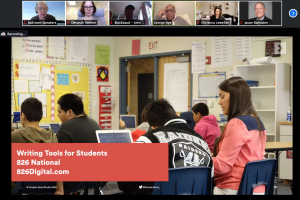MeetingMentor Magazine
COVID-19 Case Study: Going Virtual Doesn’t Have to Be a Money Loser
Christina Lewellen, MBA, CAE, faced a decision no new association executive director would want to have to make: Whether to cancel her association’s 6th annual conference in early April and face cancellation and attrition fees or try to find some other solution?
Not only was it a life-or-death decision in terms of possible infections should the meeting go on, but also one of life-or-death for ATLIS itself:
“ATLIS [the Association of Technology Leaders in Independent Schools] has only been in existence for five years, and we have a small staff. We couldn’t absorb a possible million-dollar liability and survive,” said Lewellen (pictured below).
 From Revamp to Chaos — and Back
From Revamp to Chaos — and Back
Lewellen had just assumed the ED mantle last summer and had been looking forward to her first ATLIS annual conference, to be held April 5–8 at the Chicago Marriott Downtown Magnificent Mile. She was excited for the 500-person event, which she and her staff had been working to innovate. They had already whittled down the usual 13 breakouts offered on the core education days on April 6th and 7th by crowdsourcing to find the six or seven topics that the audience really needed and located speakers who had expertise in those topics specifically. They had found news ways to up the ante production-wise via more professional production and staging options, and offered new custom branding ideas for sponsors.
“Before the world blew up, we were really excited about what this event was going to look and feel like, with more streamlined content and a more sophisticated and professional approach,” she said. And they were ready to roll a month out, the event app launched, speakers lined up and slotted into rooms, the schedule finalized, AV sourced, and food-and-beverage menus set. “I wanted to have everything ready 30 days out so I could put my attention on last-minute details and getting ready for the board meeting, which happens in conjunction with the conference,” she said.
Time to Get Proactive
As early as the first week of March, however, Lewellen had a feeling the conference may be in jeopardy due to the increasingly concerning novel coronavirus making its way across the globe. As she talked with others at the American Society for Association Executives (ASAE) Great Ideas conference in early March, concern about the coronavirus was just beginning to grow in the U.S. and association execs were starting to worry about what it could mean for their organizations.
Lewellen saw the handwriting on the wall right away, and she did not hesitate to jump on the phone with Deborah Borak (pictured below), CMM, SMMC, vice president/team director with ConferenceDirect, and her organization’s attorney, to figure out the next steps.
“The hotel was saying they weren’t going to release ATLIS from its contractual obligations because at that point the hotel, Chicago and the state of Illinois were still wide open,” said Borak. “But I’ve been through epidemics and disasters before and I knew there was going to be at least some fallout, and we wanted to get ahead of it. ATLIS at that point already had members saying they were scared to travel. It wasn’t just economics, it was health and emotional issues as well.”
 “The next 10 days felt like 10 years,” Lewellen said, as Borak helped her work with the hotel to try to mitigate some of the contractual requirements and possibly explore new dates. “I was on the phone with Deborah, pacing the floor and worrying if our association was going to be able to survive.
“The next 10 days felt like 10 years,” Lewellen said, as Borak helped her work with the hotel to try to mitigate some of the contractual requirements and possibly explore new dates. “I was on the phone with Deborah, pacing the floor and worrying if our association was going to be able to survive.
“I already was a fan of third-party planners, but Deborah is very special. Not only did she help me with long-term planning, but her getting me through all this … all I can say is I feel bad for executive directors who don’t have someone like Deborah and have to do this on their own.”
Finally, the governor of Illinois issued a stay-at-home order and locked down much of the state, including limiting public gatherings, and everything changed in one day: With force majeure now in play, the hotel released ATLIS from its contract with no penalty and promised to return its deposit.
“That was the minute I started breathing again,” Lewellen said. “We wanted to make sure if they did anything, they’d do it first for ATLIS,” said Borak, who wanted to emphasize that each case she is working varies depending on the leadership and ownership of the specific hotel — she has not seen any chainwide issues with mitigating contracts due to COVID-19. “In times like this, you value those who really partner with you. None of this has been easy, but this hotel was a good partner through this process.”
With penalty repercussions now receding, they now had to consider what to do next. Rather than cancel outright, ATLIS decided to take its meeting virtual.
With constituents faced with turning their in-person collegiate prep schools virtual, “We already were trying to support our members in what they were doing in their own environment while at the same time pulling off a transition of our own to a virtual conference.
“It was chaos, but we put one foot in front of the other and with Deborah’s help, made it through to the other side,” she said.
Ingredients for a Successful Flip
Some of the decisions that Lewellen credits the successful flip to virtual include:
• Sticking with familiar technology: Since ATLIS staff was comfortable with the Zoom virtual meeting platform since they had been using it extensively already for staff meetings, they decided to use that platform for the newly virtual annual conference. They did have to scale up the organization’s Zoom account to accommodate the breakouts and the general sessions, which needed a separate “ballroom” that could handle keynotes and the awards luncheon.
And, since they already had an event app, ATLIS staff figured out how to use it as the virtual experience portal. Attendees could go into the app, click on the link to the session they wanted, and hop right to the corresponding Zoom breakout room. ATLIS also recorded the sessions so attendees could go back later to view content they otherwise might have missed.
“We stayed with what we already knew well to make it easier to flip all this amazing content from in-person in virtual,” she said.
• Sticking with familiar scheduling: “We wrestled with whether to stay with the schedule we had for the conference, or whether to drip out the content asynchronously over several months. We decided it would be better for our members if we did it synchronously.”
• Getting speakers on board: “The first thing we did was reach out to all of our speakers and ask them if they could do this. Some were apprehensive, but 95% came back right away and said yes to presenting their assigned content on their assigned schedule, just virtually in a Zoom breakout room instead of their assigned room at the Marriott.”
• Remembering that the chat feature is your friend: While some organizations are leery of opening up chat channels during a virtual event, Lewellen said the chat function was what made the award ceremony really heartwarming, even when held virtually. “As presenters announced each winner, the chat just blew up with people saying, ‘Couldn’t go to a nicer person,’ ‘Couldn’t be more well-deserved recognition’ — in person, people might think these things but not have a way to say them while they are trying to finish their chicken and listen quietly. The running chat that unfolded was just charming.”
It also helped ease social interactions on the preconference kickoff session on Sunday evening, when ATLIS held a virtual meet-and-greet in a big Zoom room. “Our staff was so adept at jumping back and forth between what was happening on chat and what the live speaker was saying that it really wasn’t chaotic, it flowed easily,” Lewellen said. “It made the whole thing a bit cooler.”
• Being upfront about pricing: A lot of planners struggle with how to price a virtual event. In ATLIS’ case, where most attendees had already paid registration, it was definitely tricky — especially since they weren’t planning to offer full refunds. One thing they did was emphasize the benefits, such as being able to access all sessions via the archive throughout the year instead of having to choose just a few breakouts on site.
They also, as a show of good will for sticking with ATLIS through the switch to virtual, provided a 50% credit toward registration for the 2021 conference in Seattle. ATLIS will have to factor that into its budget for next year, she said. “I’ve run the projections, and it’s going to be tight, but doing this allowed us to hang onto the revenue right now and not have to deal with the nightmare of refunding half the fees. Just the paperwork would be ridiculous.”
How did attendees react? “I could count on less than the fingers of one hand the number of people who asked for a refund,” she said. “And those were people who were paying out of pocket and were facing financial hardship of their own.”
Bringing New Value to Sponsors

ATLIS used Zoom to bring its virtual meeting to life.
“The sponsor piece is where I spent the most of my time once we had attendance under control,” Lewellen said. “They had given us a check expecting one thing and now we were changing the deal.
“It was my goal to hold onto as much of that revenue as I could,” she said. “My teams and I had to dig deep to come up with creative solutions. Some of these, while they may not be a big deal to others, required me to challenge my personal philosophy on the church-and-state boundary between sponsorships and content that came from my early career position as editor of a trade magazine.
“I told them they may never see this again, but we value you and want to earn your partnership. It went over really well; only a handful of sponsors said, ‘No thanks, I signed up for a tabletop and if I’m not getting that, I’m out.’ The minute they did that, I pulled them off our website,” she said. “We love you, and we’ll talk with you next year, but now we’re going to focus on the companies that are sticking with us through this.
“We made it clear to attendees that the companies they saw in front of them had ATLIS’ back. That’s not the kind of language I would normally use, but these were weird times.”
One thing they offered was a 90-second pitch at the start of each virtual session, where the sponsor got one slide with their logo and the opportunity to just connect with attendees in a non-salesy way, to let them know the sponsor is there to help attendees’ students and schools be successful.
In her opening remarks, Lewellen also asked attendees to “take a moment to really take in the companies that are committed to helping our industry through these times, who committed to us even when we had to transition to virtual. Take a minute to thank them on Twitter, go to their workshop, because these companies are helping us through this difficult time.”
ATLIS also had a 90-minute break on day two for a vendor meet-and-greet in a Zoom room. Vendors could do whatever they wanted — a demo, a formal product pitch, a Q&A, or just to talk with customers about their challenges. “I wouldn’t call it a virtual exhibit hall or tabletop — we couldn’t do that online. I did say in my opening address that it would mean a lot if you would go to the meet-and-greet and say hi to your existing vendor partners or check out a company you may want to do business with.
“There was no way to predict how it was going to go, and it worked out really well.”
While the experience taught ATLIS a lot about being flexible and willing to challenge themselves to dig deep and think differently and step outside their comfort zones, you just can’t replace the experience of having that face-to-face connection, she said. The plan as of now is to hold ATLIS’ 2021 event in person, with her CD associate by her side.
“Having ConferenceDirect in my corner enables me to focus on what I’m hired to focus on — I can have confidence that my associate is taking care of the rest.” — Sue Pelletier
Free Subscription to
MeetingMentor Online
"*" indicates required fields
About ConferenceDirect
About MeetingMentor